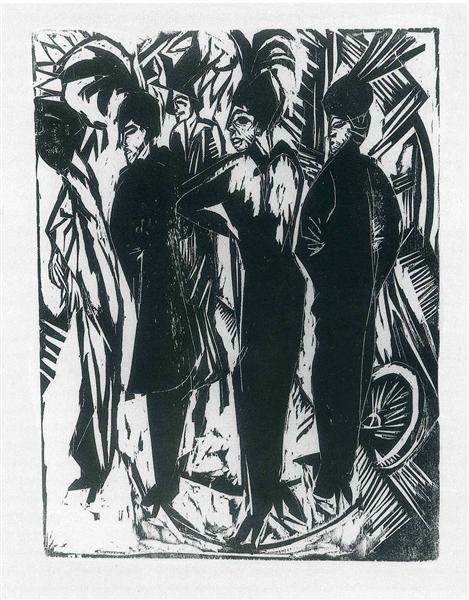Description
In "Five women in the street" (1914), Ernst Ludwig Kirchner immerses us in a visual experience that captures the vibrant and chaotic essence of urban life in the context of a modernity that, by then, was in full effervescence. This work, emblematic of expressionist informalism, reveals both Kirchner's technical mastery and his ability to reflect the psychological tensions of his time. The composition of the painting focuses on five female figures that cross the street, portrayed with bold strokes and intense colors that not only emphasize its presence, but also suggest a deeper narrative about urban identity and space.
Women, with their vigorous silhouettes and almost dramatic gestures, seem to be both protagonists and symbols of modernity. Their faces are almost devoid of specific features, which suggests a loss of individuality in a society that moves quickly towards dehumanization. This radical approach to the portrait resonates with Kirchner's own experience, who fought for alienation issues and the search for meaning in a world that changed rapidly. The use of saturated colors, such as the red vibrant and the green electrifying, contributes to an almost surreal atmosphere that intensifies the sensation of fragmentation and tension that permeates the work.
The urban fund, although less detailed, emphasizes the agitation and energy environment that characterizes life in a city. The abstracted buildings and energetic lines seem almost wrapped to the figures, suggesting that these women are inseparable from the chaotic warp of urban life. The perspective is deliberately distorted, a resource that Kirchner uses to evoke a sense of instability, which reflects his own experience of emotional anguish in the years before World War I. This compositional decision invites the viewer to share the manifest concern in the work while allowing a dialogue on the female condition in an urban context that, although liberating in many aspects, is also perceived as oppressive.
Kirchner, founding member of the Die Brücke group (El Puente), sought to challenge the artistic conventions of his time and open new routes of expression. "Five women in the street" is a paradigmatic example of this approach, while offering a subtle social criticism to superficiality that often accompanies human interactions in an industrialized environment. His works, including others such as "La Calle" (1907) and "Women in Café" (1908), explore similar issues of alienation and modernity, but "five women on the street" singularly captures an amalgam of experiences and emotions and emotions that resonate with the dynamism and complexity of modern life.
Through this painting, Kirchner not only presents a portrait of women in motion, but also challenges the viewer to reflect on their own place in an environment that can be both liberating and oppressive. "Five women on the street" transcends their time and place to offer a timeless look on the struggle for identity and presence in the frantic pulse of contemporary life, consolidating as an essential work in the canon of modern art and a vivid testimony of Kirchner's critical gaze towards the world that surrounded him.
KUADROS ©, a famous paint on your wall.
Hand-made oil painting reproductions, with the quality of professional artists and the distinctive seal of KUADROS ©.
Art reproduction service with satisfaction guarantee. If you are not completely satisfied with the replica of your painting, we refund your money 100%.

